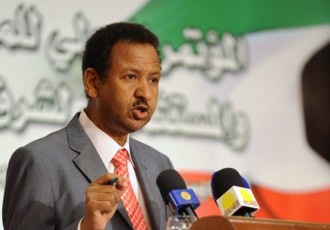Sudan’s NCP prepared to call for early elections: official
March 31,2012 (KHARTOUM) — The ruling National Congress Party (NCP) said it is willing to organise anticipated elections in the country stressing that this idea should be approved by all the Sudanese political forces.

The NCP rejected the demand and expressed willingness to associate the main opposition forces in a national unity cabinet to prepare a new Islamic constitution. The opposition National Umma Party (NUP) refused the offer while the Democratic Unionist Party (DUP) is now part of the government.
The other opposition parties particularly the Popular Congress Party (PCP) of Hassan al-Turabi are not associated to this demarche. The latter is considered by Khartoum as an ally of the rebel groups who forged a coalition to topple the regime last year.
Presidential adviser and leading NCP member, Mustafa Osman Ismail speaking in a political meeting in Algolid, northern Sudan, stated that his party is ready to hold and contest new elections one or two years before 2015, the end date of the current mandate of the government.
“We can accept the anticipated elections if the other political forces consented the proposition and we reached an agreement on it,” said the Sudanese official, pointing out the opposition is composed of two categories those who want to overthrow the regime and others who want to prepare for the elections.
He said the PCP and the Sudanese Communist Party are working with the rebel Sudan Revolutionary Front (SRF) to topple the government with the full support of the South Sudan. He further said these parties try to strengthen their position through unwise alliances.
“The SPLM deceived them in the past and now they are leaning on the ailing wall of the SRF,” he stressed.
Sudan is fighting the old comrades of South Sudan’s ruling party – the SPLM – in South Kordofan since June 2011 and Blue Nile since August that year, but now Juba is seen as the main backer of the rebel SPLM-Northern Sector and its allies from the Darfur rebel groups.
Juba, which is holding complicated talks on the outstanding issues, is perceived in Khartoum as divided over the way forward in its relations with its northern neighbour.
Trying to give his version on the issue, Mustafa said South Sudan is ruled by two groups the first which is headed by Salva Kiir, wants good relations with Khartoum while the other group “wants to undermine security and stability in Sudan,” he added.
He emphasised that he believes the second group is the most powerful and influential but said that his government is able to” thwart all their plans backed by the Western circles”.
In Khartoum, the opposition parties which welcomed the four freedoms deal reached on 13 March are voiceless over the current tensions with the South Sudan.
The National Umma Party, which is member of an opposition alliance has said it is opposed to military action against the government and disapproves of the SRF plans to topple the regime.
This position affects its relations with the other members of the National Consensus (NCF) Forces which, except the PCP, do not support the SRF. The NUP – the largest political party in the NCF – is experiencing difficulties with smaller parties over issues related to the structure of the opposition alliance.
(ST)
